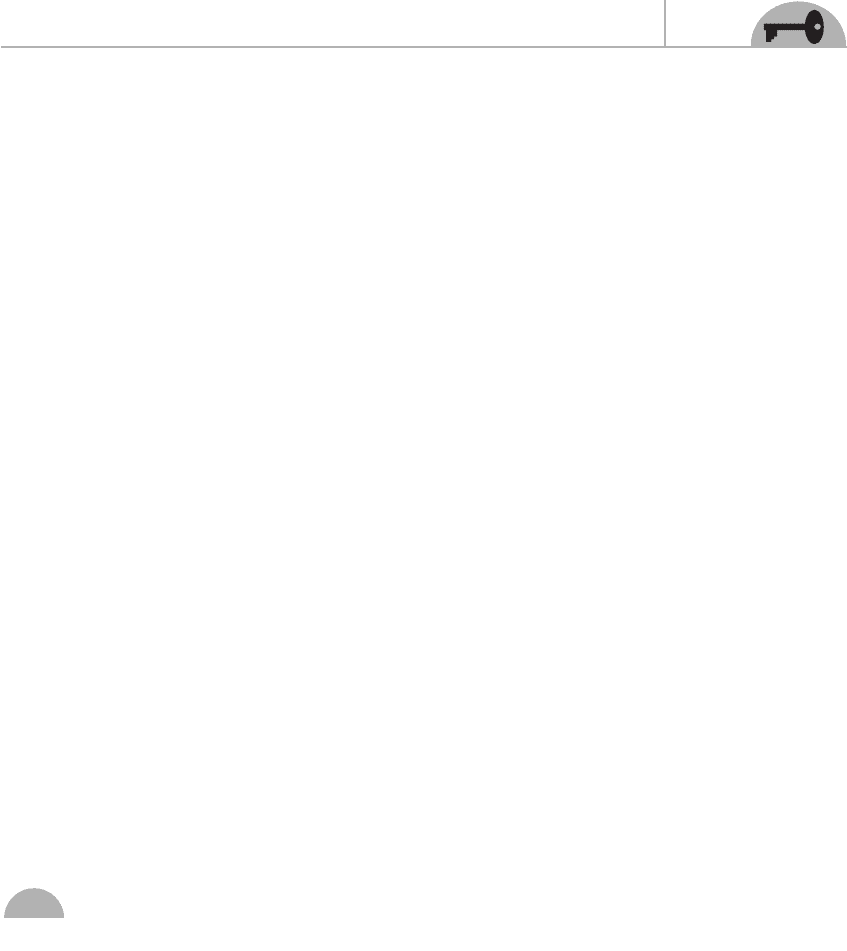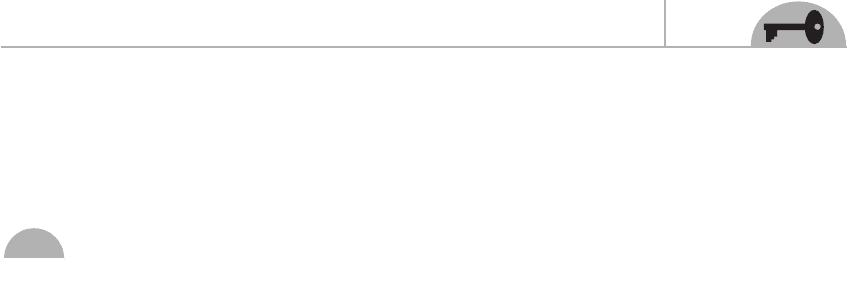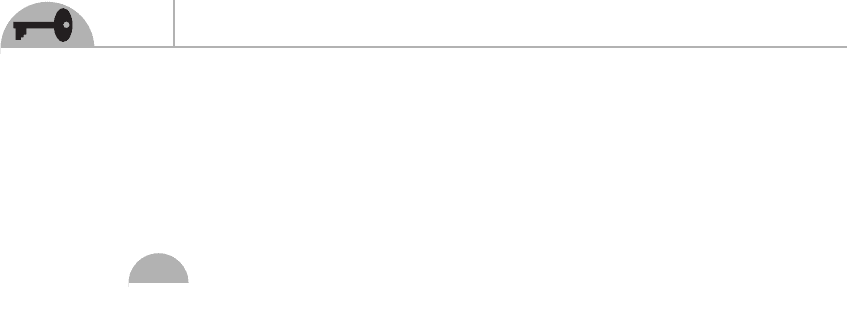Digiulio M., Keogh J. Medical-Surgical Nursing Demystified
Подождите немного. Документ загружается.


339
CHAPTER 8 Endocrine System
INTERPRETING TEST RESULTS
•
Decreased or normal serum T4 level caused by an underactive thyroid.
•
Increased serum TSH, by the pituitary gland, attempting to stimulate or shut
off production of the thyroid in making thyroid hormone.
•
RAIU uptake normal or increased—a radioactive isotope is injected into a
vein. A scan of the thyroid is done to visualize the thyroid more completely.
•
Ultrasound enables sound waves to bounce off the gland, giving the size and
location of any nodules.
TREATMENT
•
If increased TSH, administer hormone replacement with levothyroxine (T4),
dessicated thyroid, or liothyronine (T3).
•
If the thyroid gland is overactive, then administer small doses of Lugol’s
solution or potassium iodide solution.
•
If the simple goiter cannot be reduced through medication, then a thyroid-
ectomy is performed during which all or part of the thyroid is removed.
NURSING DIAGNOSES
•
Imbalanced nutrition: less than what body requires; related to inadequate in-
take in relation to metabolic needs
•
Fatigue related to sleep deprivation
•
Hyperthermia related to increased metabolic rate
NURSING INTERVENTION
•
Avoid goitrogenic foods or drugs in sporadic goiter since they make thyroid
hormone production.
•
Use iodized salt to prevent and treat endemic goiter, since the thyroid needs
iodine to make thyroid hormone.
•
Explain to patient:
•
The need for life-long thyroid replacement after thyroidectomy and radio-
active iodine.

340
Medical-Surgical Nursing Demystified
•
The need for intermittent lab work to monitor the thyroid.
•
Visits to the primary care practitioner to monitor size of thyroid gland.
Hypopituitarism
WHAT WENT WRONG?
Hypopituitarism results when the pituitary gland is unable to secrete a normal
amount of pituitary hormones. Primary causes are pituitary tumors, inadequate blood
supply to the pituitary gland, infection, radiation therapy, or surgical removal of a
portion of the pituitary gland. Secondary causes affect the hypothalamus, which
regulates the pituitary gland.
PROGNOSIS
Patients require life-long treatment and can expect a normal life span.
HALLMARK SIGNS AND SYMPTOMS
•
Fatigue caused by a decreased production of ACTH
•
Lethargy and diminished cognition caused by a decreased production of
TSH
•
Sensitivity to cold due to low TSH, which stimulates thyroid hormone
•
Decreased appetite due to TSH deficiency
•
Infertility due to luteinizing hormone (LH) and follicle-stimulating hormone
(FSH) production
•
Short stature due to diminished secretion of growth hormone
•
Infertility, amenorrhea caused by decreased production of FSH and LH
INTERPRETING TEST RESULTS
•
Decreased ACTH usually due to a lesion of the pituitary.
•
TSH deficiency due to a mass, trauma, surgery, or idiopathic.
4

341
CHAPTER 8 Endocrine System
•
Decreased prolactin due to a mass, causing diminished or lack of prolactin
from the anterior pituitary.
•
Presence of a pituitary tumor shown on MRI.
TREATMENT
•
Administer replacement hormones (estrogen, testosterone, corticosteroids,
growth hormone, and thyroid hormone).
•
Surgical removal of the pituitary tumor if it exists.
NURSING DIAGNOSES
•
Disturbed body image related to illness
•
Sexual dysfunction related to disease
NURSING INTERVENTION
•
Monitor weight daily because antidiuertic hormone (ADH) and adreno-
cortiocotropic hormone (ACTH), from the pituitary, regulate fluid retention
and excretion in the body.
•
Monitor intake and output to ensure the balance is equal due to hormone
regulation.
•
Explain to the patient:
•
The need to take medication for the rest of the patient’s life.
•
The need for frequent laboratory tests.
Hyperpituitarism
(Acromegaly and Gigantism)
WHAT WENT WRONG?
The pituitary gland produces an excessive amount of growth hormone. If hyper-
pituitarism occurs before epiphyseal closure, the patient (infants and children)
has gigantism, resulting in an overgrowth of all body tissues. If hyperpituitarism
5

342
Medical-Surgical Nursing Demystified
occurs after epiphyseal closure, which is rare, the patient has acromegaly resulting
in bone thickening, growth in width (transverse growth), and enlarged organs
(visceromegaly).
PROGNOSIS
Successful treatment can stop progression of the disease; however, physical changes
that occur before treatment begins are permanent.
HALLMARK SIGNS AND SYMPTOMS
•
Increased body size caused by overproduction of growth hormone
INTERPRETING TEST RESULTS
•
Increased serum growth hormone as the pituitary gland is producing an excess
of growth hormone.
•
Increased prolactin; most pituitary tumors will cause on overproduction of
one or more of the pituitary hormones.
•
Increased glucose; diabetes is common in acromegaly.
TREATMENT
•
Administer dopamine agonists such as bromocriptine and cabergoline to
decrease the tumor size.
•
Surgical removal of the pituitary tumor.
NURSING DIAGNOSES
•
Disturbed body image related to illness or illness treatment
NURSING INTERVENTIONS
•
Perform range of motion exercise to assure joint mobility.
•
Provide emotional support.

343
CHAPTER 8 Endocrine System
•
Educate the patient:
•
Don’t stop taking hormone replacement suddenly.
Hyperprolactinemia
WHAT WENT WRONG
There is an overproduction of the prolactin hormone that promotes lactation.
Excessive secretion is usually caused by a pituitary tumor (prolactioma) but may
also be due to hypothyroidism, chronic kidney disease, and medications that affect
the pituitary gland.
PROGNOSIS
Prognosis is very good once a diagnosis is made and treatment of the underlying
cause is started.
HALLMARK SIGNS AND SYMPTOMS
•
The primary symptom is decreased fertility.
•
In females, symptoms may include decreased or absent menstruation, head-
ache, mood changes and galactorrhea, from hormone imbalance.
•
Males may experience erectile dysfunction, diminished libido, gynecomastia,
headache and mood changes from too much hormone.
INTERPRETING TEST RESULTS
•
Increased serum TSH as hypothyroidism can be a contributing factor to hyper-
prolactimenia.
•
Increased creatinine/BUN as renal failure can be a contributing factor.
•
Serum human chorionic gonadotropin test for pregnancy (beta hGC) as preg-
nancy can cause hyperprolactinemia.
•
Serum AST, ALT, and bilirubin will be increased as cirrhosis has been known
to cause hyperprolactinemia.
6

344
Medical-Surgical Nursing Demystified
•
Serum testosterone, FSH, LH, prolactin, and estradiol may be decreased in
hypogonadism.
•
Pituitary tumor present in MRI.
TREATMENT
•
Administer dopamine agonists:
•
bromocriptine
•
cabergoline to shrink pituitary tumor and return prolactin to normal
levels
•
Discontinue medications that may be causing the pituitary glands to over-
produce prolactin:
•
amphetamines
•
estrogens
•
methyldopa
•
narcotics
•
protease inhibitors
•
risperidone
•
selective serotonin inhibitors
•
tricyclic inhibitors
•
verapamil
•
Radiation therapy to reduce the pituitary tumor.
•
Surgical removal of the pituitary tumor.
NURSING DIAGNOSES
•
Disturbed body image related to illness or illness treatment
•
Sexual dysfunction related to disease (related to loss of libido, infertility,
impotence)
NURSING INTERVENTIONS
•
Monitor serum hormone levels to assure that medication is improving the
patient’s condition.

345
CHAPTER 8 Endocrine System
Diabetes Insipidus
WHAT WENT WRONG?
Either a decrease in the production of an antidiuretic hormone (ADH) by the hypo-
thalamus or an increase in the production of ADH by the pituitary compromises
the ability of the kidneys to concentrate urine. This results in the excretion of large
amounts of diluted urine. The patient then drinks large amounts of fluid to replace
the increased urine output.
PROGNOSIS
Treatment will eliminate the symptoms of diabetes insipidus and the patient can
expect a normal life span.
HALLMARK SIGNS AND SYMPTOMS
•
Increased urination as the kidneys fail to concentrate urine
•
Increased thirst as the body attempts to replace lost fluid
INTERPRETING TEST RESULTS
•
Normal blood glucose indicating that diabetes insipidus isn’t a complication
of diabetes mellitus.
•
Low specific gravity in urine due to increased fluid in the urine.
•
Increased BUN, indicating dehydration because the concentration of solutes
to fluid is rising.
•
Electrolytes indicate dehydration; Na and Cl will rise as the concentration
increases.
•
Vasopressin challenge test. Those patients with diabetes insipidus will note
a decrease in output and thirst.
•
If urine output decreases and urine specific gravity increases, then the prob-
lem is with the pituitary gland and kidneys are normal.
•
If urine output remains unchanged and urine specific gravity remains low,
then the pituitary gland is normal and the kidneys are the problem.
•
Presence of a pituitary tumor or hypothalamus tumor appear on an MRI.
7

346
Medical-Surgical Nursing Demystified
TREATMENT
•
Administer replacement ADH hormone such as desmopressin to return nor-
mal urination.
•
Administer a diuretic such as hyrdrochlorothiazide to decrease urination.
•
Place the patient on a low-salt diet to reduce urine production in the kidneys.
•
Increase fluid intake until urination returns to normal.
NURSING DIAGNOSES
•
Risk for impaired urinary elimination
•
Impaired oral mucous membrane related to inadequate oral secretions
•
Deficient fluid volume related to excessive fluid loss or inadequate fluid intake
NURSING INTERVENTION
•
Maintain fluid and electrolyte balance.
•
Monitor intake and output.
•
Weigh the patient each day using the same scale, at the same time of day,
wearing similar clothing.
•
Explain to the patient:
•
Medication must be taken every day.
•
Wear a medical alert necklace/bracelet to alert health care providers that
you have diabetes insipidus.
Syndrome of Inappropriate Anti-
diuretic Hormone Secretion (SIADH)
WHAT WENT WRONG?
SIADH is caused by too much ADH being secreted by the posterior pituitary
gland. ADH is responsible for controlling the amount of water reabsorbed by the
kidney; it prevents the loss of too much fluid. When too much water is detected,
ADH production or secretion is halted. SIADH may be caused by damage to the
8

347
CHAPTER 8 Endocrine System
hypothalamus or pituitary, inflammation of the brain, some medications such as
selective serotonin receptor inhibitors (SSRIs), carbamazapine, cyclophosphamides,
and chlorpropamide. Certain cancers, especially lung, may produce ADH.
PROGNOSIS
If sodium (Na) levels are kept within normal limits, prognosis is excellent.
HALLMARK SIGNS AND SYMPTOMS
•
Headaches due to hyponatremia
•
Nausea and vomiting due to hyponatremia
•
Confusion due to hyponatremia
•
Personality changes due to hyponatremia
INTERPRETING TEST RESULTS
•
Hyponatremia (low serum sodium) due to the dilution.
TREATMENT
•
Administer saline IV to replenish sodium.
•
Treat underlying cause.
NURSING DIAGNOSES
•
Risk for imbalanced fluid volume
•
Excess fluid volume
NURSING INTERVENTION
•
Monitor electrolytes to determine sodium levels.
•
Restrict fluid because excess fluid dilutes sodium levels.

348
Medical-Surgical Nursing Demystified
•
Weigh the patient daily using the same scale, at same time of day with similar
clothing.
•
Monitor intake and output.
Addison’s Disease
WHAT WENT WRONG?
Addison’s disease is inadequate secretion of corticosteroids from the adrenal cortex,
resulting from damage to the adrenal cortex. Autoimmune destruction of the adrenal
gland and tuberculosis are two common causes of Addison’s disease. A patient can
experience Addisonian crisis when infection, surgery, or other stressful events results
in a decrease in the production of cortisol and aldosterone. Addisonian crisis is a
medical emergency.
PROGNOSIS
With ongoing treatment, patients can expect a normal life span.
HALLMARK SIGNS AND SYMPTOMS
•
Weakness due to insufficient cortisol
•
Weight loss due to insufficient cortisol
•
Orthostatic hypotension due to poor fluid status from aldosterone deficiency
•
Bronzing of the skin due to hyperpigmentation from the autoimmune disease
INTERPRETING TEST RESULTS
•
Increased BUN due to dehydration.
•
Increased serum potassium from changes in aldosterone secretion.
•
Decreased serum cortisol being secreted from the adrenal cortex.
•
Decreased serum glucose from decreased corticosteroids.
•
Positive 24-hour urine aldosterone level due to less aldosterone being secreted.
9
